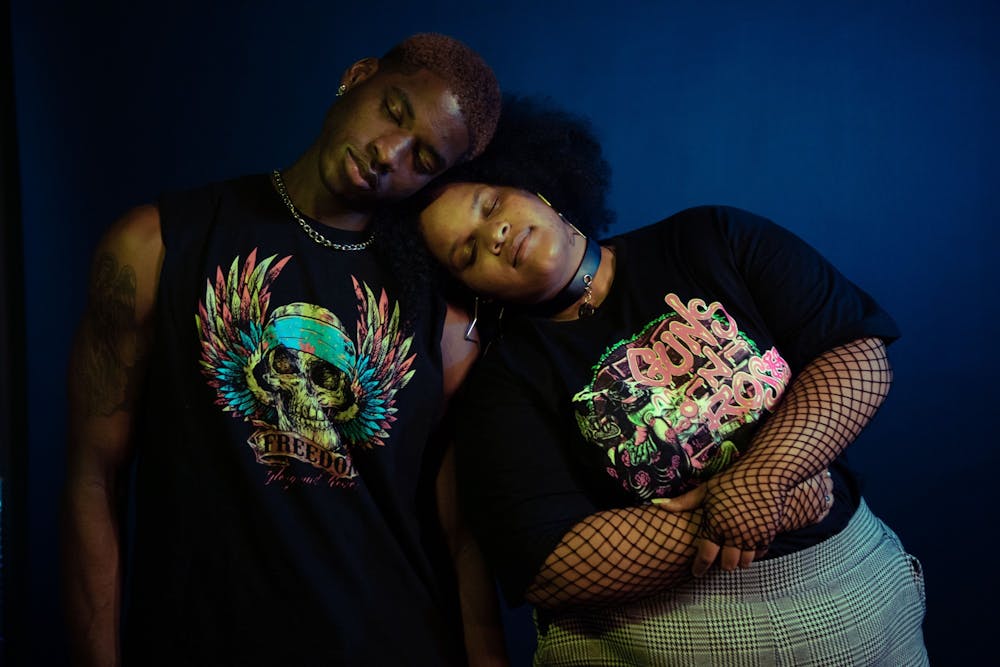Those that identify with punk and alternative subcultures pride themselves in personal expression and nonconformity. From their clothes to the bands they like, they emphasize the importance of individuality, which means everyone has their own idea of what it is to be punk.
“It’s more of a mindset, not necessarily a lifestyle, because there’s no defining factor,” said Nori Noir, a 34-year-old fashion designer and artist from Columbia. “It’s kind of hard to say punk is one thing because I feel whenever you start to try to categorize punk, it becomes un-punk.”
Noir finds that the versatility and expansiveness of punk is one of their favorite parts about it. “I love that everyone can find their own place where they fit in,” they said.
Noir is the creator and designer of Internet Crush, a clothing brand that combines chic, grungy streetwear with high fashion. With the goal of sustainability, the pieces are repurposed vintage clothing, which they spend hours of thrifting a week to find. A quick glance at the brand’s website reveals a range of fashion: studded platform boots, band tees and chained skirts.
Some of Noir’s inspirations include the 80s and 90s style icons, like Jeremy Scott and Vivienne Westwood, and even anime. In other words, “it’s a mix of nostalgia, icons and the current Internet,” they said.
Noir embraced the punk alternative scene around middle school when they felt an urge to deviate from the mainstream. Some of their early fashion choices included drawing and painting on their clothes or splitting them in half and sewing them back together.
For them, fashion is wearable art. Often, it is the first aspect you notice about someone. It’s “the first thing you get to say to anyone without saying anything,” Noir said, pointing to their outfit, piercings and tattoos, most of which they did themselves when they were a teenager.
Noir currently has a studio with their work at Tapps Outpost, a hub that supports upcoming artists in the Columbia area.
While many Black people are a part of the punk and alternative movement, it has been whitewashed since its emergence in the 1970s. Like most musical genres, it fails to credit the influence of Black creators. For instance, rock ‘n’ roll owes its birth to artists such as Chuck Berry, Little Richard and Sister Rosetta Tharpe.
“Black people created rock ‘n’ roll and all the sectors of punk, metal, whatever we have now,” Noir said. “Being black is punk in itself.”
Others also note the lack of diversity and culture in the punk alternative scene, particularly in Columbia.
Ben Wright, a 22-year-old Columbia resident, observes that it has its challenges.
He finds that stereotypical African American culture can sometimes be closed off to other interests. “It can be extremely hard to try to find something new or to get out of your comfort zone and even admit to yourself that you like something,” Wright said.
However, Wright never let that stop him. “Probably when I was about twelve, I started finding music on my own. Nirvana was one of the first bands I ever listened to, and I just fell in love with the whole grunge and punk scene.”
His tastes have changed over time. When he was younger, he listened to artists like Fall Out Boy, The Cure and Tupac. In recent years, he’s delved into the works of Lenny Kravitz, Prince and The Black Pumas.
“I don't want to clarify myself with one genre, or style, of people,” Wright said. “But I'd like to say that it's a little bit more on the alternative punk side.”
In terms of the alternative punk scene in Columbia, Wright believes that it most definitely exists. One of his favorite places is New Brooklyn Tavern, the oldest continuous running music venue in the area.
“They have a reputation for being probably one of the most punk places in Columbia because they're well known,” Wright said. “They do their hardest to keep it clean and have a really good, friendly environment there.”
He has attended shows there since he was thirteen years old, and the venue has experienced changes over the years. One of his favorite performances at the venue was in 2016 by a local alternative band known as the Brigades.
“Everybody was having a good time,” Wright said. “People were moshing. I saw a kid get punched in the face. It was great.”
Wright also creates his own music. Ever since learning the guitar, he’s wanted to tackle more personal subjects in his songs.
“Most artists, if you really listen closely, they're talking about their own experiences or how they feel, or anything that they need to get off their chest,” Wright said. “It’s like therapy.”
Surprisingly, he pulls most of his inspirations from the genres of Indie, Neo-soul and R&B, as opposed to punk and alternative. However, it doesn't mean he loves the genre any less. For those wanting to know more about Black people in the punk alternative scene, Wright recommends doing a deep dive into Afro-punk.
In recent years, the punk alternative scene has fostered a more accepting environment as people become more knowledgeable about the genre's past.
"It's become more of an accepting thing where people are going back to their roots," Nori Noir said. "I can feel more comfortable with indulging in it too."



